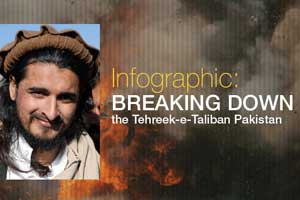New Taliban Leader
The Tehreek-e-Taliban Pakistan (TTP) have elected Maulana Fazlullah as their new chief after the death of the previous leader in a US drone strike, according to a spokesperson for the group.
The spokesman said that Fazlullah's appointment meant that peace talks with the Pakistan government were now off the table.
Fazlullah led the Taliban's brutal two-year rule in Pakistan's northwestern valley of Swat from 2007 to 2009, before a military operation retook the area.
He takes over leadership of the Tehreek-e-Taliban Pakistan (TTP) after Hakimullah Mehsud was killed in a US drone strike last Friday.
TTP spokesperson Shahidullah Shahid confirmed the appointment to Al Jazeera, adding that Khalid Haqqani had been named Fazlullah's deputy.
"I congratulate all the Muslim brothers that Maulana Fazlullah has been elected as the new chief of Tehreek-e-Taliban Pakistan," Asmatullah Shaheen, the interim TTP chief, said, according to the AFP news agency.
Regarding the possibility of peace talks, Shahid said: "Holding of peace talks is not even an issue to discuss - this government has no authority, it is not a sovereign government, it is a slave, a slave of America. Holding peace talks is a waste of time."
Gunfire in Miranshah
 |
| Al Jazeera's guide to who's who among the top ranks of the Pakistani Taliban |
There was heavy gunfire in celebration in Miranshah, the main town in the North Waziristan tribal area, following the announcement.
The killing of Mehsud on Friday came as government representatives prepared to meet the TTP with a view to opening peace talks.
The drone strike triggered an angry response from Islamabad, with Interior Minister Chaudhry Nisar accusing the United States of sabotaging peace efforts.
During Fazlullah's rule in Swat, the Taliban enforced a rigorous interpretation of Islamic law, publicly beheading and flogging wrongdoers and burning schools.
Bloody campaign
Fazlullah first came to prominence due to his links to the Tehreek-e-Nifaz Shariat-e-Muhammadi (TNSM), a local group led by his father-in-law that had been agitating for the implementation of Sharia law in the Swat Valley.
He gained publicity for running an anti-government radio station, coming to be known as "Mullah Radio" in the valley and beyond.
Following an increasingly bloody campaign to take control of the valley, the Pakistani government finally ceded control of the Swat Valley and allowed the implementation of Sharia law through an agreement in 2009.
That agreement also immediately broke down, however, when the Taliban attempted to expand the areas under their control, and Fazlullah was ousted after a violent military campaign that killed hundreds and displaced millions.
Since then, Fazlullah's TTP had been operating from outside the Swat Valley, carrying out a series of targeted attacks against those who opposed them, including peace committee leaders and rights activists.
His group was also responsible for the attempt on schoolgirl activist Malala Yousafzai's life in 2012.
Local Pakistani authorities say that Fazlullah has been operating for over the past year from the Afghan province of Kunar, along the border with Pakistan.
His men were blamed for beheading 17 Pakistani soldiers in a checkpost attack in June 2012, and he appeared in a video posted online in September claiming a bomb blast that killed a major general.
In another video he vowed to do whatever it took to enforce sharia across Pakistan.
"We will eliminate anything that will get in the way of achieving this goal: father or brother, soldier or police, khan or malik [tribal elders] or mullah," he said in the undated footage.
The TTP, an umbrella organisation grouping numerous militant factions, has killed tens of thousands of soldiers, police and civilians in its campaign against the Pakistani state since it was first established in 2007
No comments:
Post a Comment